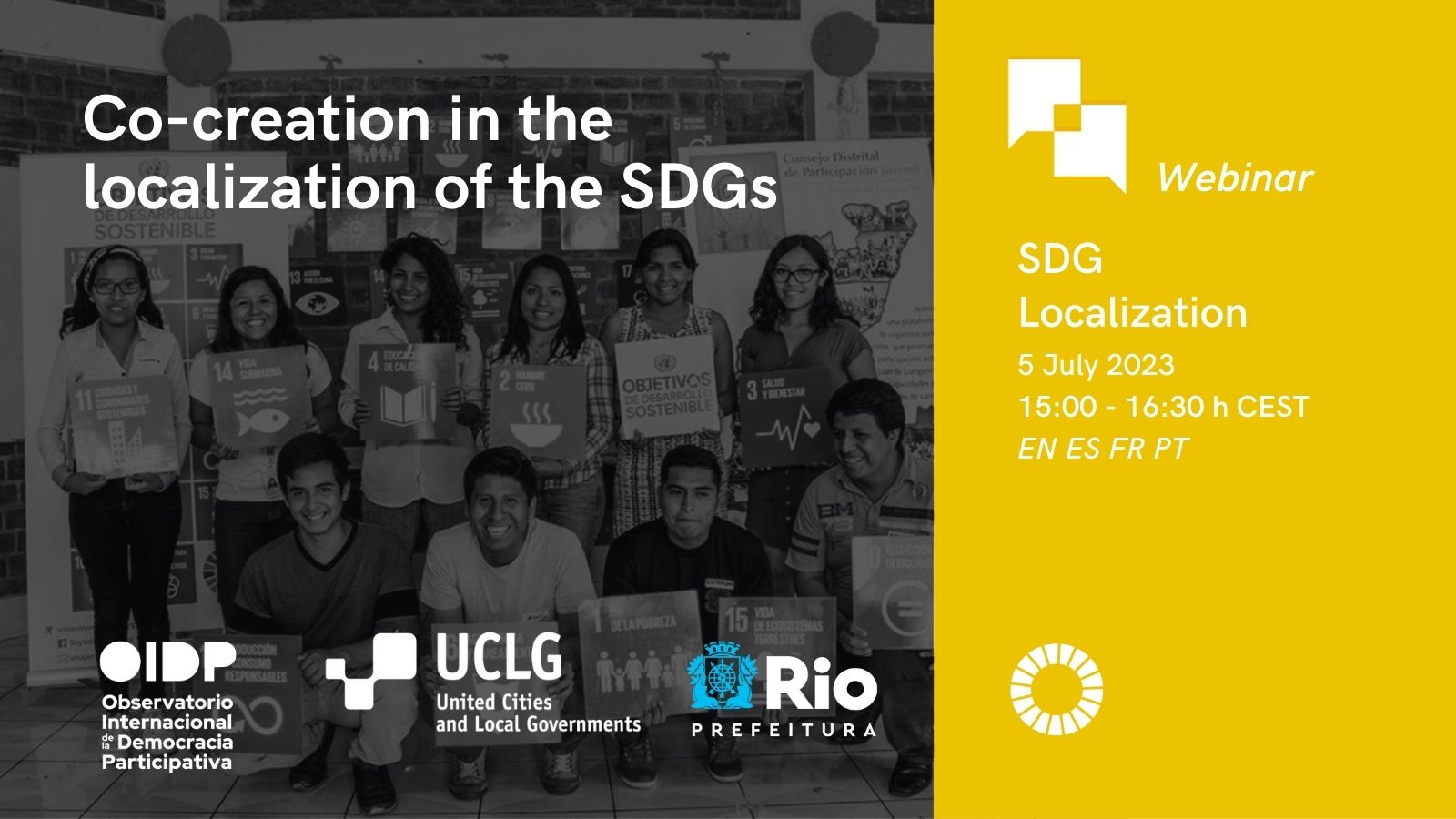Citizenship and local governments co-creating the localization of the 2030 Agenda and the SDGs.

The International Observatory on Participatory Democracy (IOPD) and the City of Rio de Janeiro with the support of United Cities and Local Governments extend the invitation to the webinar Co-creation in the localization of the SDGs, Citizenship and local governments co-creating the localization of the 2030 Agenda and the SDGs.
5 July 2023, 15:00 - 16:30 h CEST. Virtual meeting via Zoom
Interpretation: English, French, Spanish and Portuguese
The objective of this session is to highlight the importance of citizen participation and co-creation practices in the SDG localization agenda, see concrete examples and generate recommendations for other local and regional governments.
The webinar is realized as part of the preparatory activities for the 21st IOPD Conference to be held in Rio de Janeiro from November 6 to 8 with the theme "Participatory Democracy for Diverse, Inclusive and Transparent Cities.
Context
The 2030 Agenda is a guide for the global development programs until 2030, centering action on people, planet, and prosperity, also seeking to strengthen universal peace and justice access. It was adopted in 2015 by the United Nations member states, who recognize that eradicating poverty in all its forms and dimensions, including extreme poverty, is the greatest global challenge and an indispensable requirement for sustainable development.
To achieve its objectives, the 2030 Agenda delineates 17 Sustainable Development Goals (SDGs) with 169 targets to take bold, collaborative, and transformative steps for shifting the world onto a sustainable and resilient path. The SDGs are integral and indivisible strategies for taking action to address a range of social needs, such as food sovereignty, access to water and sanitation, climate, gender equality, and building sustainable cities and communities.
The 2030 Agenda implies a common and universal commitment. However, understanding that each member state faces specific challenges to achieve sustainable development, each will localize its goals and take action based on its context. Localizing the SDGs means rooting the 2030 Agenda implementation in local and regional priorities.
When adopting the 2030 Agenda, UN member states committed to working closely with local and regional governments to implement the SDGs. Monitoring the localization strategies is also an essential step toward localizing the SDGs, in which local and regional governments are increasingly engaging with the Voluntary Local Reviews (VLRs). These follow-up and review local mechanisms complement and enhance the progress assessment at the national level of the Voluntary National Reviews.
While SDG 11 directly calls for cities and human settlements to become safe, resilient, and sustainable" in ensuring non-poverty, gender equality, peace, and the rest of the goals, local and regional governments play a fundamental role, being closest to the communities that have the potential to take bold and transformative action towards a more sustainable, just and resilient world. Localizing the SDGs also entails increasing local and regional government activity and bringing the Agenda closer to the people.
Participatory and Deliberative Democracy (PDD) is the exercise of democracy beyond electing political representatives. Some of the most widespread practices of PDD are participatory budgets, citizen assemblies, participatory planning, or other exercises that allow the co-creation, implementation, and evaluation of public policies by inhabitants.
Citizen participation is not only the exercise of a political right but also the opportunity for policies to be more legitimate, more inclusive, and more transformative. In this sense, PDD is an unbeatable opportunity to achieve the localization of the SDGs while giving the opportunity to co-creating an innovative governance framework that is meaningful and practical in the lives of citizens.
Guiding questions for the session
Resources